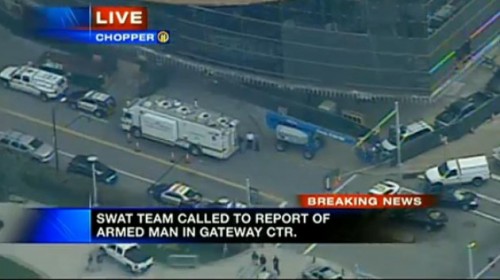 Just as I arrived in Pittsburgh this morning, the city was virtually shut down by a hostage crisis. A man claiming to have a gun and explosives entered a law office with weapons and held a lawyer hostage for several hours. Eventually, the hostage-taker (named Klein Michael Thaxton) surrendered and no one was physically harmed.
Just as I arrived in Pittsburgh this morning, the city was virtually shut down by a hostage crisis. A man claiming to have a gun and explosives entered a law office with weapons and held a lawyer hostage for several hours. Eventually, the hostage-taker (named Klein Michael Thaxton) surrendered and no one was physically harmed.
This sort of story might not have been of much interest (beyond serving as a local news spectacle) except for one small detail: The perpetrator was using Facebook to provide live updates about the situation.
At first the police allowed this continue hoping to gain valuable information about the nature of the situation, but, eventually, they leaned on Facebook to have his account blocked. These decisions about how to handle the perpetrator’s online communications became as important as any decisions about how the police should act offline (e.g., should they raid the building or send in a negotiator?) because the police knew instinctively what social media researcher so often have to argue: Our online interactions have real, and often direct, offline consequences.
While it is interesting that the hostage-taker was acting as his own journalist, documenting the event for the world, media analyses have glossed over a more important issue: The fact that this communication was two-way. This event is one of the first instances where a hostage-taker’s lines of communication to the outside world weren’t exclusively channeled through the police. Traditional negotiations have relied, in part, on the fact that the perpetor is dependent on police to be in touch with the outside world. This gives police leverage in the form of something to offer/deny the perpetor. Mobile access to social media short circuits this relationship, leaving the police with far less control over the situation. Following the standard logic of traditional bureaucratic organization, the police shutoff communication and re-instituted a definitive hierarchical order, noting it is positve “that people are concerned about his well-being [but that] it is a distraction for negotiating.”
Was this really a smart move? The question strikes at the heart ofa major debate surrounding social media: whether social media is a legitimate and effective source of social support. Most social science research from the last decade (Sherry Turkle notwithstanding) argues that it does, and that this social support tends to flow back and forth between online and offline interactions. This case seems to provide even further evidence.
 What’s fascinating is that the perpetrator’s friends immediately rushed to his Facebook page, urging him to cooperate with police and offering support. It is quite plausible that such messages factored into his decision to surrender and made the situation feel less hopeless.
What’s fascinating is that the perpetrator’s friends immediately rushed to his Facebook page, urging him to cooperate with police and offering support. It is quite plausible that such messages factored into his decision to surrender and made the situation feel less hopeless.
Of course, we can’t yet know for sure what he was thinking. More details will surely emerge. But regardless of how social media actually influenced this particular situation, the tradeoff between diminished control and increased social support will likely be important for how police and governments think about social media in the future.

Comments 3
Pittsburgh’s Hostage Crisis, the Police, and the Politics of Social Media « PJ Rey's Sociology Blog Feed — September 21, 2012
[...] Reposted from Cyborgology. [...]
whitneyerinboesel — September 22, 2012
interesting points about the power and control issues involved in police usually serving as the medium of communication between a hostage-taker and the rest of the world; i hadn't thought of that. what was most striking to me was the visibility piece: it's not usually the case that the rest of the world can see or hear the conversations that go on between a hostage-taker and anyone, nor the case that those conversations are captured in records that many people can access.
and though you're right--we don't know what he was thinking, or what he considered when he decided to end the situation peacefully--i'm willing to bet that generally, getting a message from a loved one goes a lot further than conversations with police in terms of talking down people with weapons. on the other hand, the General Public of facebook is not comprised of trained negotiators, and i can see other types of messages--say, from estranged friends or angry exes--working in the opposite direction. risks and benefits, i guess.
Pittsburgh’s Hostage Crisis, the Police, and the Politics of Social Media | Flash Politics & Society News | Scoop.it — September 22, 2012
[...] Just as I arrived in Pittsburgh this morning, the city was virtually shut down by a hostage-taking crisis. A man claiming to have a gun and explosives entered a law office with weapons and held a lawyer hostage for several hours. [...]